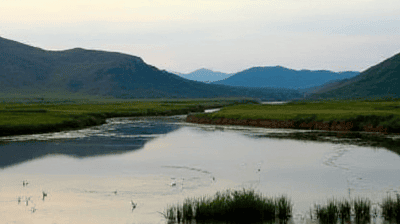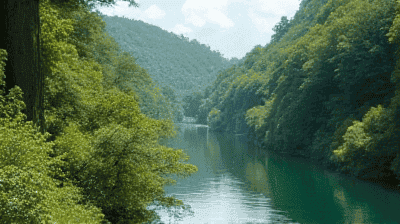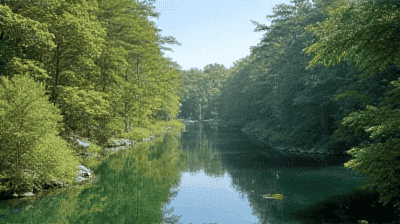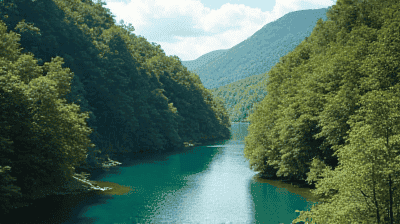
As humanity grapples with unprecedented environmental challenges, from climate change to biodiversity loss, traditional governance frameworks often fall short in effectively protecting ecosystems. The concept of granting legal personality to nature, particularly rivers, has gained traction as a transformative approach to environmental conservation. By recognizing rivers as legal entities with rights, we can redefine our relationship with nature and create new pathways for protecting vital ecosystems.
The Rights of Nature is a legal and philosophical framework that posits that nature, like humans, has inherent rights that should be acknowledged and protected by law. This concept challenges the anthropocentric view that nature exists solely for human exploitation and instead promotes the idea that ecosystems possess intrinsic value and rights.
The Rights of Nature movement emphasizes that ecosystems—such as rivers, forests, and mountains—should be regarded as living entities with their own rights to exist, flourish, and evolve. This approach seeks to reshape legal systems worldwide to recognize and protect the rights of nature, fostering a more harmonious relationship between humanity and the environment.
The Rights of Nature movement is not a new concept. Its roots can be traced back to various indigenous cultures globally, where nature is viewed as a living entity deserving respect and care. In these worldviews, rivers and forests are often considered relatives or kin, emphasizing the interconnectedness of all living beings.
In recent decades, the modern Rights of Nature movement has gained momentum, with several countries and local jurisdictions recognizing nature's rights in their legal frameworks. Notably, Ecuador became the first country to enshrine the rights of nature in its constitution in 2008, followed by Bolivia and other jurisdictions around the world.
The idea of granting legal personality to rivers involves recognizing them as entities that can hold rights and interests within a legal framework. This notion allows rivers to be represented in court, giving them the ability to defend their rights against polluters, developers, and other actors harming their ecosystems. By assigning legal personality to rivers, we create a legal basis for protecting their health and integrity, thus supporting the broader aim of ecological conservation.

Rivers play a crucial role in maintaining ecosystem health and supporting human well-being. They provide a multitude of essential services, including:
Water Supply: Rivers are a primary source of drinking water for millions of people worldwide. They support agriculture, industry, and domestic needs, making their health vital for sustainable livelihoods.
Biodiversity Habitats: Rivers and their surrounding ecosystems support diverse flora and fauna. Healthy river systems provide critical habitats for fish, amphibians, birds, and other wildlife, promoting biodiversity.
Nutrient Cycling: Rivers facilitate nutrient cycling in ecosystems, transporting organic matter and nutrients essential for the health of aquatic and terrestrial systems. This cycling supports food webs and contributes to overall ecosystem productivity.
Cultural and Recreational Value: Rivers hold cultural significance for many communities, serving as sites for spiritual practices, recreation, and tourism. They contribute to the well-being and quality of life for individuals and communities.
Despite the invaluable services rivers provide, they face numerous threats that jeopardize their health and the ecosystems they support:
Pollution: Industrial runoff, agricultural chemicals, and untreated sewage often contaminate river systems, leading to severe water quality issues and harm to aquatic life.
Dams and Water Diversion: The construction of dams and water diversion projects can disrupt natural flow patterns, fragment habitats, and alter ecosystems. Damming rivers can also lead to the displacement of communities and biodiversity loss.
Climate Change: Climate change exacerbates existing pressures on rivers, leading to altered precipitation patterns, increased flooding, and droughts. These changes further stress freshwater ecosystems and local communities dependent on them.
Over-extraction: Unsustainable water extraction for agricultural, industrial, and domestic use poses significant threats to river ecosystems. Over-extraction can lead to reduced water flow, habitat degradation, and diminished ecological resilience.
One of the most notable examples of granting legal personality to a river is the Whanganui River in New Zealand. In 2017, the New Zealand government enacted legislation recognizing the river as a legal entity with rights and legal standing. This recognition followed decades of advocacy by the Whanganui Iwi (indigenous people), who sought acknowledgment of their ancestral connection to the river.
The legislation grants the river rights to exist, flourish, and evolve, and it establishes a legal framework for its protection. The Whanganui River is now represented by two guardians, one appointed by the government and the other by the Whanganui Iwi. This unique legal status has paved the way for collaborative management efforts and ecological restoration projects.
In 2017, the Uttarakhand High Court in India declared the Ganges River and its tributaries as legal entities, granting them the rights of a person in the eyes of the law. This landmark decision aimed to protect the river from pollution and degradation, acknowledging its spiritual and cultural significance as a sacred waterway for millions.
The ruling empowers the Ganges to defend its rights and enables the appointment of legal guardians to oversee its welfare. This legal recognition offers hope for enhancing the ecological health of the Ganges, which has faced severe pollution and over-extraction issues for decades.
Following the recognition of the Ganges, the Yamuna River also received similar legal status in 2018. The Dariya Project, an initiative led by young activists and environmentalists, advocated for the rights of the Yamuna, emphasizing the need to protect its ecological integrity. The High Court's ruling acknowledged the river's right to flow free of pollution and degradation, reinforcing the need for sustainable management practices.

Granting rivers legal personality allows for more robust protection measures and enforcement capabilities. With the ability to represent themselves in court, rivers can aggressively challenge polluters and unsustainable practices. This novel legal framework shifts the burden of proof, placing responsibility on those harming the river rather than on the river itself.
Recognizing rivers as legal entities empowers local communities and indigenous groups who depend on these ecosystems for their livelihoods. These communities gain a voice in protecting their cultural and environmental heritage, promoting a sense of stewardship and responsibility toward the river.
Legal recognition of rivers facilitates ecosystem restoration efforts. Environmental organizations, government agencies, and local communities can collaborate to develop and implement restoration projects aimed at improving water quality, restoring habitats, and rebuilding ecological resilience.
By giving rivers legal personality, we encourage collaborative governance approaches that transcend traditional jurisdictional boundaries. This interconnectedness can lead to more comprehensive and effective watershed management strategies, promoting ecological health across entire river basins.
Implementing legal personality for rivers requires significant changes to existing legal and regulatory frameworks. Many legal systems operate on anthropocentric principles, prioritizing human interests over ecological ones. Transitioning to a model that recognizes the rights of nature necessitates a reevaluation of existing laws and policies.
Industries that depend on the exploitation of river resources may resist efforts to grant legal personality to rivers, fearing restrictions on their activities. Resistance may come from agricultural, industrial, and energy sectors that benefit from practices leading to pollution and habitat destruction.
Public awareness of the Rights of Nature and the concept of legal personality for rivers remains limited. Building support at local, national, and global levels is essential to drive advocacy efforts and push for legal changes. Education and awareness campaigns are crucial for fostering public understanding of the benefits of recognizing rivers as legal entities.
Successful implementation of legal personality for rivers requires political will and diplomatic engagement across various levels of government. Political leaders must prioritize environmental issues and recognize the importance of safeguarding natural ecosystems to enact meaningful change.

The Rights of Nature movement continues to gain traction worldwide, as individuals, communities, and organizations advocate for legal recognition of natural entities. Grassroots initiatives are emerging to promote awareness and inspire action, ultimately aiming to reshape legal frameworks to protect ecosystems.
As awareness of the Rights of Nature expands, there is potential for global legislation recognizing the rights of nature at international forums, such as the United Nations. Global legal frameworks could serve as standards for individual countries to adopt, further legitimizing the Rights of Nature and promoting a more sustainable ecological future.
The recognition of rivers as legal entities fosters experimentation with new governance models that prioritize ecological well-being. Collaborative governance among stakeholders, including governmental bodies, indigenous communities, and NGOs, can lead to innovative approaches for watershed management.
By granting rivers legal personality, we can foster long-term resilience and ecological sustainability. Healthy rivers with legal protection will be better positioned to withstand the impacts of climate change, pollution, and habitat destruction, ensuring the continuity of vital ecosystem services for future generations.
The concept of granting legal personality to rivers represents a transformative shift in environmental governance and protection. By recognizing rivers as legal entities, we can elevate their status in our legal systems, offering a robust mechanism for safeguarding ecosystem health and integrity. The Rights of Nature movement provides an opportunity to reframe our relationship with the environment, acknowledging the intrinsic value of ecosystems and their rightful place within the legal framework.
While challenges remain, the growing momentum of the Rights of Nature movement suggests a promising future for environmental protection. As we confront urgent ecological crises, embracing innovative legal approaches that uplift nature's rights may hold the key to sustaining our planet's landscapes and ecosystems for generations to come.